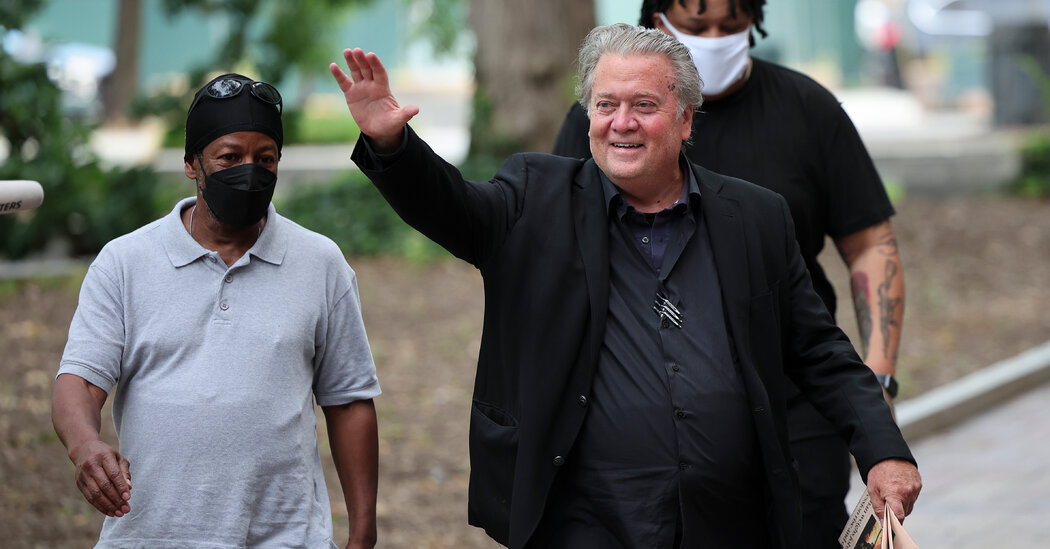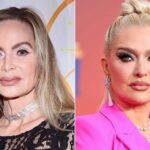
WASHINGTON — After weeks of legal wrangling and heated speeches on the courthouse steps, the criminal trial of Stephen K. Bannon, a onetime aide to former President Donald J. Trump, opened on Tuesday as prosecutors told the jury they would have to answer a simple question: Did Mr. Bannon defy the House select committee investigating the Jan. 6 attack on the Capitol by blatantly ignoring a subpoena?
Mr. Bannon, who left the White House in 2017, was indicted in November on two counts of contempt of Congress after he refused to comply with the committee’s formal demand for records and testimony concerning the Capitol riot. The filing of charges was widely seen at the time as a litmus test for whether the Justice Department would take an aggressive stance against one of Mr. Trump’s top allies as the House seeks to develop a fuller picture of the actions of the former president and his inner circle before and during the attack.
Prosecutors insisted that Mr. Bannon had clearly violated the law. “It wasn’t optional, it wasn’t a request and it wasn’t an invitation — it was mandatory,” Amanda Vaughn, a federal prosecutor, said of the subpoena Mr. Bannon ignored. “The defendant decided he was above the law and didn’t have to follow the government’s orders like his fellow citizens.”
“This whole case,” Ms. Vaughn went on, “is just about a guy that refused to show up.”
M. Evan Corcoran, a lawyer for the defense, countered the assertion that Mr. Bannon willfully ignored the subpoena, saying that the committee had not mandated him to comply.
“You’ll find from the evidence that the date on the subpoena was the subject of ongoing discussions and negotiations,” Mr. Corcoran said. “The dates on the subpoena were not fixed; they were flexible.”
Key Revelations From the Jan. 6 Hearings
The defense also emphasized the political nature of the House committee and its members, urging jurors to consider whether the evidence to be presented during the trial was tainted by politics.
Throughout the proceedings, Mr. Bannon remained calmly seated, dressed in a black suit jacket and wearing a black mask.
The government’s first witness on Tuesday, Kristin Amerling, the deputy staff director and chief counsel to the Jan. 6 committee, outlined how the panel sought to provide a “complete account” of what happened on Jan. 6 and the importance of the subpoena as a fact-finding tool.
In the months after his indictment, Mr. Bannon raised a number of objections to the charges, seeking to get them dismissed before the trial began and hinting at defenses he intended to make before a jury.
At first he argued that he had disregarded the subpoena on the advice of his lawyer and therefore should not face criminal charges. He also claimed that Mr. Trump had authorized him to ignore the committee’s demands and that legal memos written by the Justice Department shielded current and former presidential aides like himself from having to testify in front of Congress.
But in a series of rulings, some as recently as last week, Judge Carl J. Nichols systematically swept away those arguments, leaving Mr. Bannon and his lawyers little to work with. The rulings by Judge Nichols, a former law clerk for Justice Clarence Thomas who was appointed by Mr. Trump, were detrimental enough to Mr. Bannon’s chances in court that one of his lawyers, David I. Schoen, sarcastically asked Judge Nichols why his client should bother to go to trial.
Mr. Bannon did, however, have one more gambit up his sleeve, reversing course at the 11th hour by offering to testify to the committee. In court papers, prosecutors dismissed the move as a stunt, likening Mr. Bannon to a bank robber who returned the money he had stolen in a ploy to get the charges against him dropped.
The defense squabbled again on Tuesday morning with the judge and prosecutors over the limitations it faced, asking for a one-month delay that Judge Nichols ultimately denied.
“Mr. Bannon has a full story for why he didn’t show up — his advice of counsel, the invocation of executive privilege, questions about its validity and so on,” Mr. Schoen said in court before opening arguments began. “All of these defenses and his story of the case have been barred by the court at the government’s request.”
The charges against Mr. Bannon center on his failure to appear before the House committee to give testimony in October and his failure to provide documents to the committee days later.
Another former aide to Mr. Trump, Peter Navarro, has also been charged with contempt of Congress for defying a subpoena from the committee. On the same weekend that prosecutors announced those charges, Justice Department officials revealed that they would not seek indictments against two other former Trump advisers who refused to comply with committee subpoenas, Mark Meadows, Mr. Trump’s final chief of staff, and Dan Scavino Jr., Mr. Meadows’s deputy.
After a lengthy selection process, a jury of nine men and five women were seated on Tuesday afternoon, several of whom said they had watched or seen clips of hearings held by the Jan. 6 committee.
The defense had previously filed motions to delay the trial, saying that the continuing televised hearings held by the House committee and news coverage of the charges against Mr. Bannon would make it difficult to gather a neutral jury. The judge declined to do so, but advised jurors on Tuesday not to consume news or social media about the trial, which may overlap with a public hearing the committee is expected to hold on Thursday night.




